Key takeaways:
- Understanding vendor negotiations involves focusing on collaboration and building trust, which fosters a productive atmosphere.
- Preparation, defining clear objectives, and building rapport are essential strategies that significantly influence negotiation outcomes.
- Flexibility and patience help uncover better terms and can lead to mutually beneficial solutions, making compromise a priority.
- Active listening allows for a deeper understanding of the vendor’s needs, transforming negotiations into genuine partnerships.
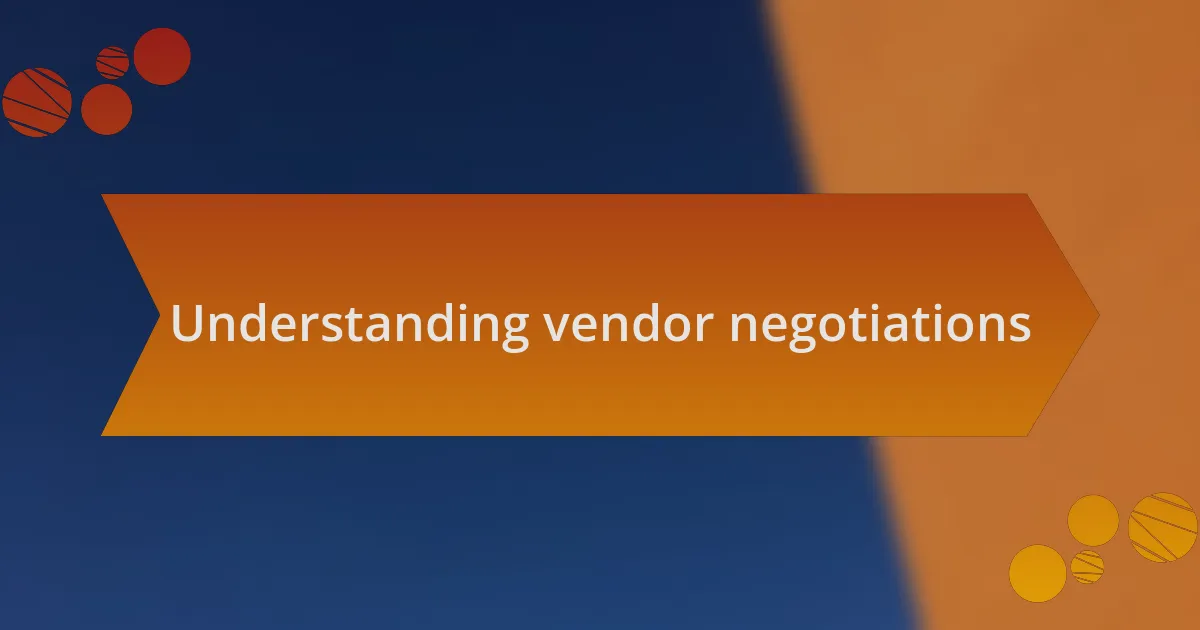
Understanding vendor negotiations
Navigating vendor negotiations can feel daunting, especially when emotions run high. I remember my first negotiation where I felt almost overwhelmed; the stakes seemed huge. It made me realize how crucial it is to understand not just the numbers, but also the relationships involved.
Every conversation with a vendor is an opportunity to create a partnership rather than just a transaction. I’ve often found that when I approach negotiations with the mindset of collaboration, rather than confrontation, it changes the dynamics entirely. Have you ever noticed how both parties tend to relax when they sense a shared purpose? That’s the magic of understanding each other’s needs.
As I gained more experience, I learned the value of preparation. Knowing your vendor’s strengths and weaknesses can provide leverage, but also foster respect. I recall a time when I took the time to research my vendor’s past projects. This not only impressed them but also paved the way for a more meaningful conversation about mutual goals. Isn’t it fascinating how knowledge can transform a tense negotiation into a fruitful dialogue?
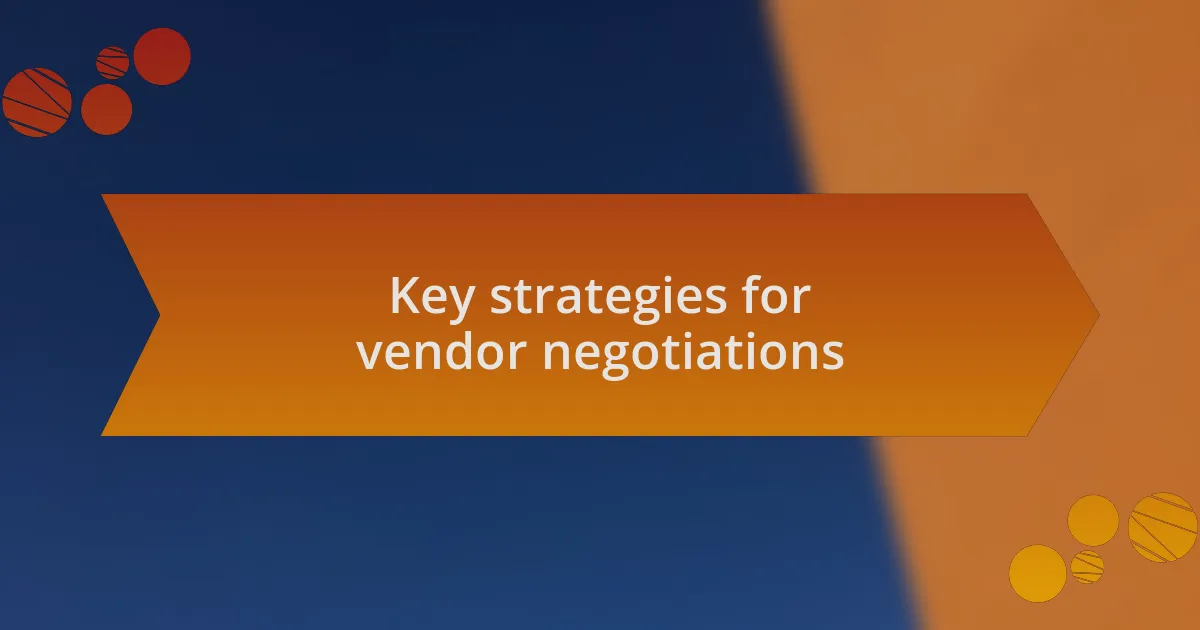
Key strategies for vendor negotiations
When it comes to vendor negotiations, setting clear objectives is crucial. I’ve found that defining what you want—whether it’s pricing, terms, or delivery schedules—helps guide the conversation. Have you ever walked into a negotiation without a clear goal? I certainly have, and it felt like navigating a ship without a compass; you end up drifting instead of making progress.
Another effective strategy is to build rapport before diving into the specifics. I remember attending an art exhibition where I casually chatted with a vendor about their latest pieces. That simple interaction broke the ice and made the negotiation feel more personal and less transactional. Isn’t it interesting how small talk can lay the groundwork for larger discussions?
Finally, don’t underestimate the power of patience. I once rushed a negotiation, eager to wrap it up quickly, only to realize later that I had left money on the table. Slowing down can reveal opportunities for better terms or added value. Have you ever rushed a decision in a negotiation? Taking the time to explore options can change the outcome dramatically, leading to a more satisfying agreement for both parties.
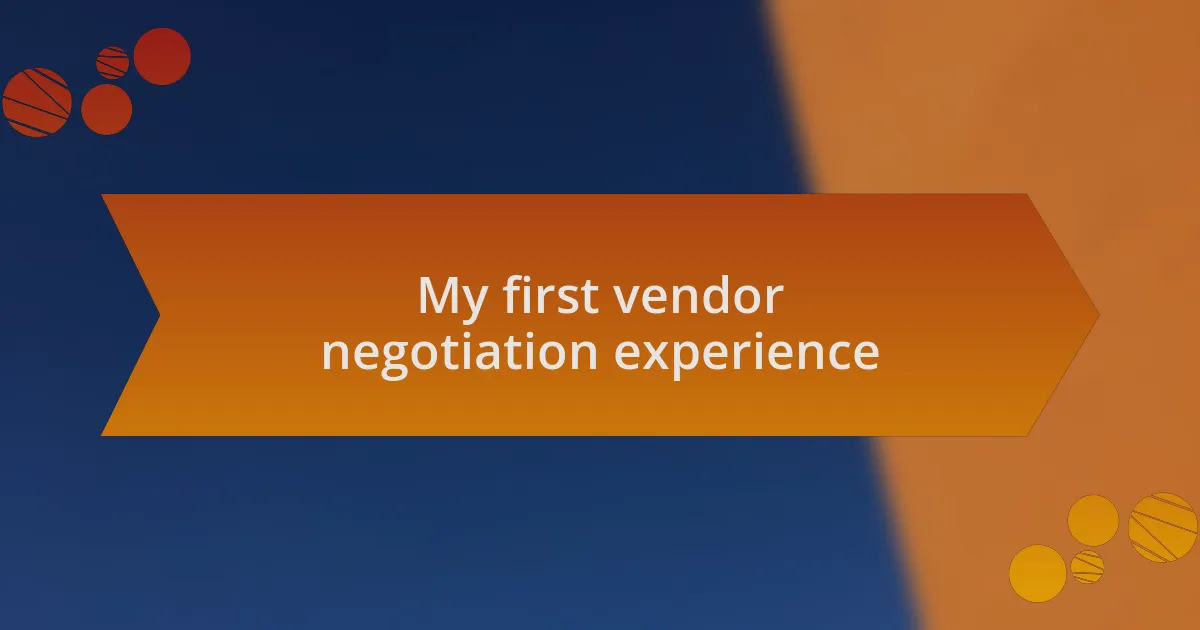
My first vendor negotiation experience
My first encounter with vendor negotiation felt like stepping onto a stage without a script. I vividly recall meeting with a local supplier who was known for their unique materials. I arrived thinking I had a solid grasp of what I wanted, but as the conversation unfolded, I realized I was more focused on being agreeable than advocating for my needs. Looking back, I now understand how important it is to affirm your worth in negotiations. Have you ever found yourself hesitating to voice your expectations, fearing it might sour the relationship?
One moment that stands out was when the conversation shifted toward pricing. I felt my stomach drop as I heard the initial offer—it was far more than I anticipated. Heart racing, I knew I needed to respond thoughtfully rather than impulsively. It was a lesson in self-control; I took a deep breath, countered with a reasonable proposal, and, much to my surprise, the vendor was open to discussion. Have you ever felt that surge of courage when standing your ground during a tough negotiation?
As we wrapped things up, I felt a mix of relief and accomplishment. I had navigated the tricky waters of a vendor negotiation with more finesse than I thought possible. That first experience taught me a great deal about the balance of assertiveness and adaptability. Isn’t it fascinating how each negotiation is not just about the deal itself but also about learning more about yourself?
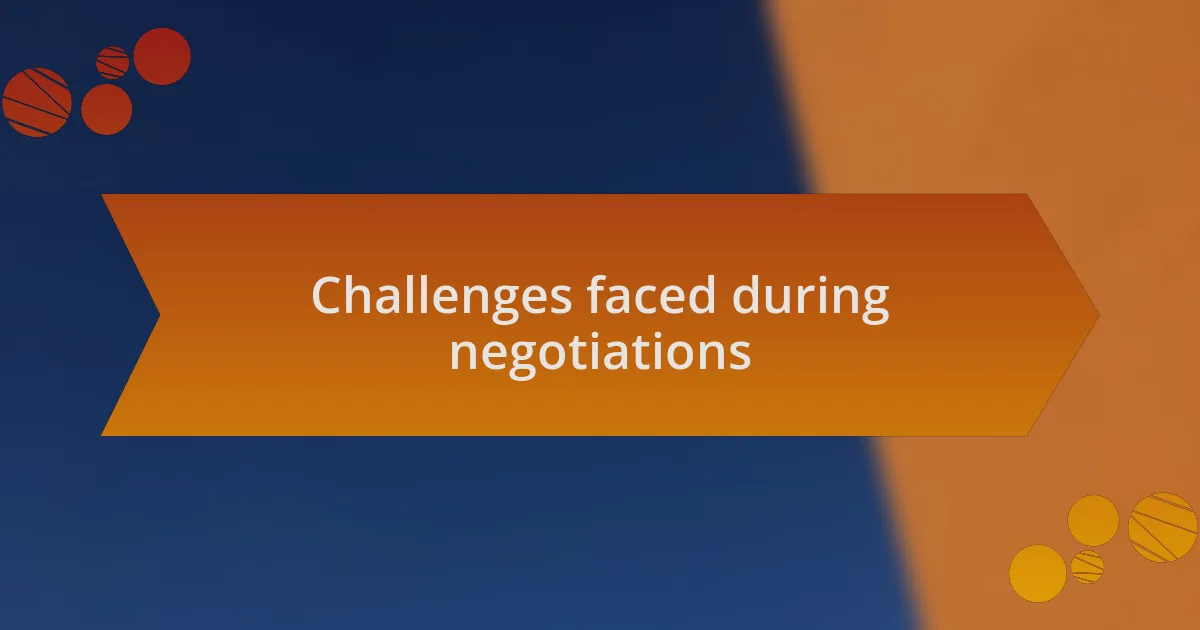
Challenges faced during negotiations
Negotiating with vendors often feels like navigating a minefield. In one instance, I found myself not only bargaining over price but also wrestling with the vendor’s emotional reactions. I remember their hesitance when I asked for a discount; it felt like I was challenging their craftsmanship. Have you ever felt such pressure, where the stakes seemed higher than just dollars and cents?
Communication breakdowns can be another significant hurdle. I once misinterpreted a vendor’s proposal, assuming their terms were more favorable than they actually were. It was a humbling moment when I gained clarity only after reviewing the details together. How frustrating is it when miscommunication leads to misunderstandings that can derail an entire negotiation?
Time constraints can add immense pressure, too. During a critical negotiation, I was racing against an impending event deadline. Each minute felt like a countdown, and I was torn between exploring more options and closing the deal quickly. In those moments, I learned that sometimes, patience can be a negotiator’s best friend. Have you ever felt that urgency to make a deal, only to realize that taking a step back could lead to a more beneficial outcome?
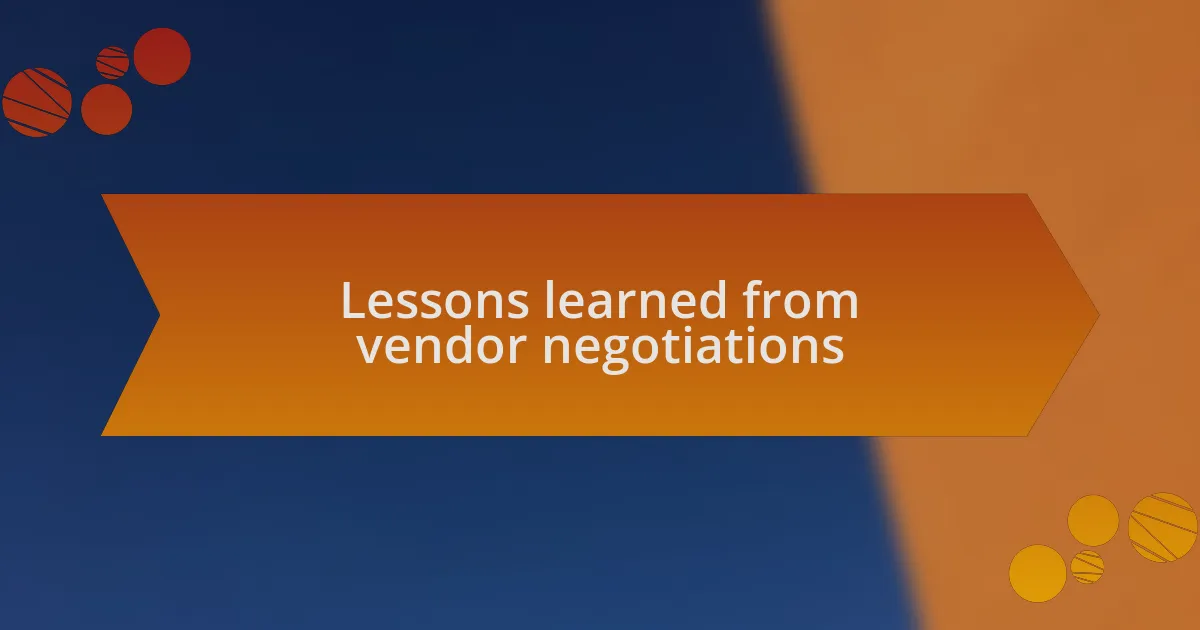
Lessons learned from vendor negotiations
Lessons learned from vendor negotiations
One of the most critical lessons I learned is the importance of building rapport. I recall a negotiation where establishing a personal connection with the vendor shifted the entire dynamic. Instead of just being a faceless entity, I became someone they could relate to. Have you ever noticed how a simple conversation can break down barriers and create a more collaborative atmosphere? That experience taught me that trust can be more valuable than any discount we might be fighting for.
Another insight centers on the necessity of clarity in communication. In a previous negotiation, I arrived with assumptions that led to a tangled web of misinterpretations. It was a challenging moment when I realized that clarity on both sides was essential to avoid future headaches. It’s intriguing to think how much smoother the process could have been if I had simply asked more questions upfront. Have you found that to be true in your negotiations?
Lastly, I’ve come to truly appreciate the art of compromise. There was a time when I clung too tightly to my initial demands, believing that I had to win every point. But as I learned to focus on mutual benefits, the conversations became not just about winning, but about reaching a satisfactory solution for both parties. How often do we overlook potential win-win scenarios simply because we don’t want to budge on our original stance? This realization has reshaped my approach to negotiations, making collaboration a priority rather than a concession.
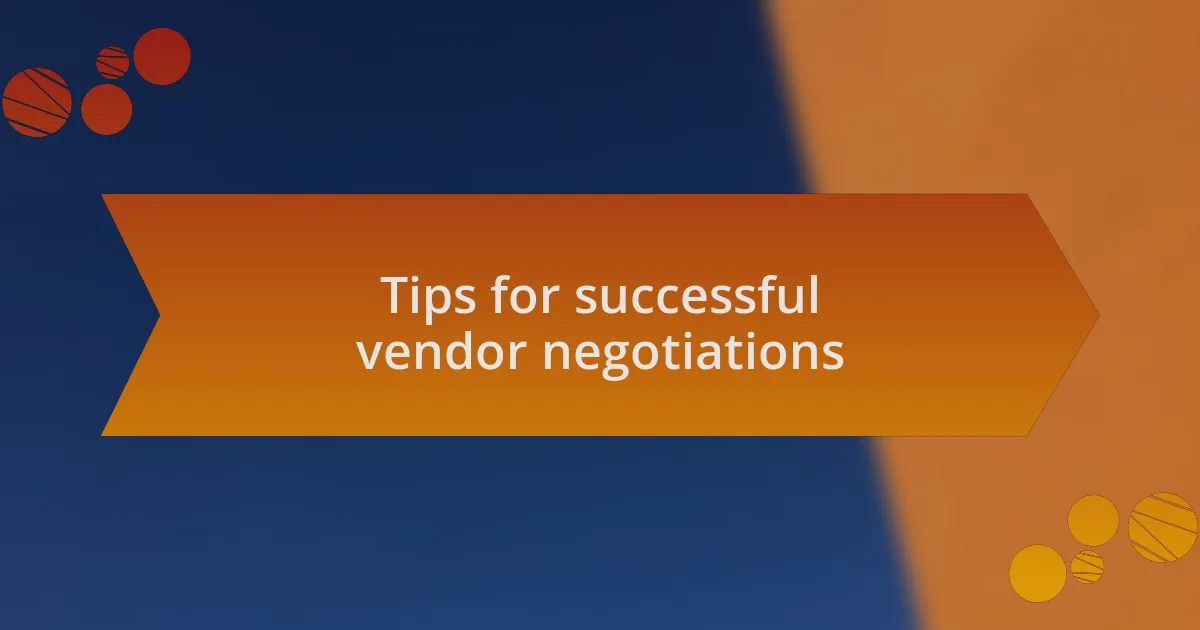
Tips for successful vendor negotiations
When it comes to vendor negotiations, preparation is invaluable. In one particular instance, I took the time to thoroughly research the vendor’s background and product offerings, which empowered me during the discussions. Have you ever walked into a negotiation feeling underprepared? The confidence that stems from being well-informed can shift the odds in your favor dramatically.
Flexibility is another critical factor in successful negotiations. I remember a time when I had to adjust my expectations because a vendor couldn’t meet my initial demands. Instead of viewing this as a setback, I saw it as an opportunity to find creative alternatives that ultimately benefited both parties. How often do we stick rigidly to our demands, when being open to adjustment could lead us to unexpected solutions?
Listening actively during negotiations is often overlooked but immensely powerful. Just last month, I found that a vendor’s seemingly small comment revealed a significant insight into their challenges and priorities. By paying close attention, I was able to tailor my proposals more effectively. Aren’t the best negotiations those where both sides feel heard and valued? Being attuned to the other party can transform a transaction into a genuine partnership.